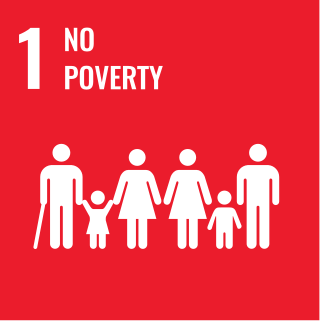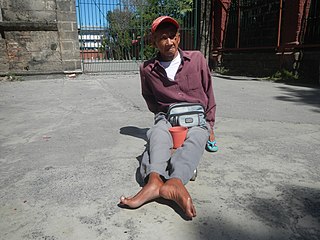Related Research Articles

Papua New Guinea, officially the Independent State of Papua New Guinea, is a country in Oceania that comprises the eastern half of the island of New Guinea and its offshore islands in Melanesia. It shares its only land border with Indonesia to the west and it is directly adjacent to Australia to the south and the Solomon Islands to the east. Its capital, located along its southeastern coast, is Port Moresby. The country is the world's third largest island country, with an area of 462,840 km2 (178,700 sq mi).

Accessibility is the design of products, devices, services, vehicles, or environments so as to be usable by people with disabilities. The concept of accessible design and practice of accessible development ensures both "direct access" and "indirect access" meaning compatibility with a person's assistive technology.
The United Nations World Summit for Children was held in the United Nations Headquarters in New York City on 29–30 September 1990. The summit had the then-largest-ever gathering of heads of state and government to commit to a set of goals to improve the well-being of children worldwide by the year 2000. It was the first time a UN conference had set a broad agenda for a wide range of goals in health, education, nutrition and human rights.

The human right to water and sanitation (HRWS) is a principle stating that clean drinking water and sanitation are a universal human right because of their high importance in sustaining every person's life. It was recognized as a human right by the United Nations General Assembly on 28 July 2010. The HRWS has been recognized in international law through human rights treaties, declarations and other standards. Some commentators have based an argument for the existence of a universal human right to water on grounds independent of the 2010 General Assembly resolution, such as Article 11.1 of the International Covenant on Economic, Social and Cultural Rights (ICESCR); among those commentators, those who accept the existence of international ius cogens and consider it to include the Covenant's provisions hold that such a right is a universally binding principle of international law. Other treaties that explicitly recognize the HRWS include the 1979 Convention on the Elimination of All Forms of Discrimination Against Women (CEDAW) and the 1989 Convention on the Rights of the Child (CRC).
The International Disability Alliance (IDA), created in 1999, is an umbrella organization focused on improving awareness and rights for individuals with disabilities around the globe. The IDA works with Non Governmental Organizations (NGO's), supranational organizations such as the United Nations (UN), as well as state governments in order to create legislation, fund disability programs in developing and industrialized countries, and advocate for people with disabilities around the world. The IDA works very closely with the United Nations, and in particular they use the United Nations Convention on the Rights of Persons with Disabilities (UNCRPD) as their code of conduct.
Reproductive justice is a critical feminist framework that was invented as a response to United States reproductive politics. The three core values of reproductive justice are the right to have a child, the right to not have a child, and the right to parent a child or children in safe and healthy environments. The framework moves women's reproductive rights past a legal and political debate to incorporate the economic, social, and health factors that impact women's reproductive choices and decision-making ability.

The Convention on the Rights of Persons with Disabilities is an international human rights treaty of the United Nations intended to protect the rights and dignity of persons with disabilities. Parties to the convention are required to promote, protect, and ensure the full enjoyment of human rights by persons with disabilities and ensure that persons with disabilities enjoy full equality under the law. The Convention serves as a major catalyst in the global disability rights movement enabling a shift from viewing persons with disabilities as objects of charity, medical treatment and social protection towards viewing them as full and equal members of society, with human rights. The convention was the first U.N. human rights treaty of the twenty-first century.

UNICEF Indonesia is one of over 190 national offices of the United Nations Children’s Fund. As one of the first UNICEF offices established in Asia, UNICEF Indonesia has been on the ground since 1948 to uphold the rights of children in the vast archipelago, including their right to education, healthcare, and protection from abuse and exploitation. It also advocates for political change in support of children, and works with partner organizations from the public, charity, and private sectors, to effect change.
Papua New Guinea (PNG) is a constitutional parliamentary democracy with an estimated population of 6,187,591. Police brutality, provincial power struggles, violence against women, and government corruption all contribute to the low awareness of basic human rights in the country.

The UNICEF East Asia and Pacific Regional Office, also known as UNICEF EAPRO, is one of seven regional offices that support the work of the United Nations Children's Fund. Globally, UNICEF works to promote children's rights in over 150 developing countries.

Armenia was admitted into the United Nations on 2 March 1992, following its independence from the Soviet Union. In December 1992, the UN opened its first office in Yerevan. Since then, Armenia has signed and ratified several international treaties. There are 20 specialized agencies, programs, and funds operating in the country under the supervision of the UN Resident Coordinator. Armenia strengthened its relations with the UN by cooperating with various UN agencies and bodies such as the International Monetary Fund, the World Bank, the World Food Programme, and with the financial institutions of the UN. Armenia is a candidate to preside as a non-permanent member of the UN Security Council in 2031.

Disability in Yemen has been increasing over time, especially because of increased conflict in the area. Disabled people in Yemen face many challenges due to poverty, lack of accessible infrastructure, gender segregation and more. The government of Yemen has passed laws to help protect the rights of disabled people in their country, but not all laws are equally enforced.
Disability affects many people in Zimbabwe in both rural and urban areas. In spite of services provided by the government, philanthropists and welfare agencies, people with disabilities and their families often face several barriers. Philanthropist, Jairos Jiri, started services for people with disability in Zimbabwe in the 1940s. He is regarded as the father or founder of disability work in Zimbabwe.
Examples of Gender inequality Papua New Guinea includes poverty, violence, limited access to education and health care, and witch hunts. Cases of violence against women in PNG are under reported. There is also a lack of services for women who experience violence. There are reports of sexual abuse by police officers, on arrest and whilst in police custody. These incidents lack documentation or investigation, consequently, perpetrators are rarely prosecuted or punished. The government of Papua New Guinea (PNG) has introduced legislation to combat these issues, though with limited success.
Protection of children’s rights is guaranteed by the Constitution of the Republic of Azerbaijan and a number of other laws. Children’s rights embrace legal, social and other issues concerning children.
The UN Secretary-General’s Independent Accountability Panel (IAP) is the only fully independent accountability mechanism established by the United Nations on women's, children's and adolescent health under the 2030 agenda for sustainable development. Founded in 2015 under a mandate by the United Nations Secretary-General, it provides an independent review of progress on the implementation of the Global Strategy for Women's, Children's and Adolescents’ Health (2016–30) − from the specific lens of who is accountable to whom, for what and how. It is composed of an autonomous group of internationally recognized experts and leaders appointed by the UN Secretary-General in 2016. The IAP is hosted by the Partnership for Maternal, Newborn & Child Health (PMNCH) based at the World Health Organization in Geneva, Switzerland.

Sustainable Development Goal 1, one of the 17 Sustainable Development Goals established by the United Nations in 2015, calls for the end of poverty in all forms. The official wording is: "No Poverty". Member countries have pledged to "Leave No One Behind": underlying the goal is a "powerful commitment to leave no one behind and to reach those farthest behind first". SDG 1 aims to eradicate every form of extreme poverty including the lack of food, clean drinking water, and sanitation. Achieving this goal includes finding solutions to new threats caused by climate change and conflict. SDG 1 focuses not just on people living in poverty, but also on the services people rely on and social policy that either promotes or prevents poverty.

Individuals with disabilities are more susceptible to contracting COVID-19 and have higher mortality rates compared to those without disabilities. This is particularly true for people with intellectual and developmental disabilities, those residing in care facilities, and women with disabilities. Individuals with disabilities face heightened risks of mental health issues related to the pandemic, such as increased feelings of loneliness and isolation. They may also be more vulnerable to domestic violence and abuse during the pandemic. People with disabilities are more likely to experience unemployment as a result of the pandemic and may require changes to the types of accommodations they require for work. Children with disabilities experience complications in their educational programming. Remote learning poses a host of challenges for children with disabilities, including disruptions to physical and occupational therapies and access to assistive technologies.

Climate change disproportionately affects individuals with disabilities, both directly and indirectly. Individuals with disabilities are more likely to experience the effects of climate change on humans more acutely compared to those without disabilities. Typically, disabled people are the most likely to be negatively affected by any form of emergency, whether it be an immediate emergency like a flood or tornado or a gradual emergency like rising sea levels, due to a lack of access to emergency resources and the difficulties imposed by limited mobility. Disabled people are also more adversely affected by climate change because a disproportionate number of disabled people live in poverty, and people living in poverty are inherently more at risk due to climate change. Despite this, and despite the fact that disabled people make up more than 15% of the global population, they have had minimal input and involvement in the decision-making process surrounding responses to climate change. A 2022 study by the Disability-Inclusive Climate Action Research Programme revealed that only 37 of 192 State Parties to the Paris Agreement currently refer to persons with disabilities in their nationally determined contributions, while only 46 State Parties refer to persons with disabilities in their domestic climate adaptation policies.
Elizabeth (Sabet) Cox is an Australian national who has lived and worked in the East Sepik Province of Papua New Guinea (PNG) for four decades. Together with others, she founded HELP-Resources, an NGO with a focus on rural and grassroots communities, in 1998. She later became Pacific Regional Director of UN Women.
References
- 1 2 3 "UN Women helps people with disabilities advocate for disability-Inclusive policies in Papua New Guinea". UN Women – Asia-Pacific. 2022-07-12. Retrieved 2023-06-07.
- ↑ "Look at my ability, not my disability | UNICEF Papua New Guinea". www.unicef.org. Retrieved 2023-06-07.
- ↑ Peters, Sean (2021-06-24). "Improving the Lives of People With Disabilities Through Influencing the Legal Framework in Papua New Guinea". CBM Australia. Retrieved 2023-06-07.